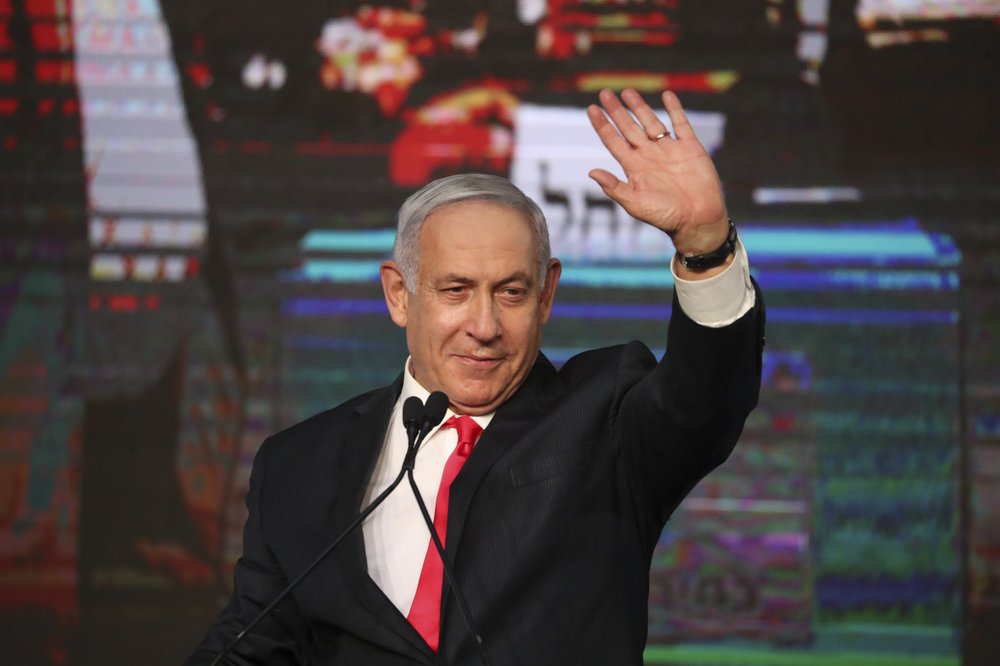

Israeli parliamentary elections on Tuesday resulted in a virtual deadlock for the fourth time in the past two years, exit polls indicated, leaving Prime Minister Benjamin Netanyahu with an uncertain future and the country facing the prospect of continued political gridlock.
The exit polls on Israel’s three main TV stations indicated that both Netanyahu and his religious and nationalist allies, along with a group of anti-Netanyahu parties, both fell short of the parliamentary majority required to form a new government. That raised the possibility of an unprecedented fifth consecutive election later this year.
The election was seen as a referendum on Netanyahu’s polarizing leadership style, and the initial results showed that the country remains as deeply divided as ever, with an array of small sectarian parties dominating the parliament.
The results also signaled a continuing shift of the Israeli electorate toward the right-wing, which supports West Bank settlements and opposes concessions in peace talks with the Palestinians. That trend was highlighted by the strong showing of an ultranationalist anti-Arab religious party.
After three previous inconclusive elections, Netanyahu had been hoping for a decisive victory that would allow him to form a government with his traditional ultra-Orthodox and hard-line nationalist allies and seek immunity from corruption charges.
In an address to supporters early Wednesday, a subdued Netanyahu boasted of a “great achievement” but stopped short of declaring victory. Instead, he appeared to reach out to his opponents and called for the formation of a “stable government” that would avoid another election.
“We must not under any circumstances drag the state of Israel to new elections, to a fifth election,” he said. “We must form a stable government now.”
By early Wednesday, updated exit polls on two channels were forecasting an evenly divided parliament. The third station gave Netanyahu’s opponents a one-seat advantage.
Exit polls have often been imprecise in the past, meaning the final results, expected in the coming days, could still shift the balance of power. If the final results are in line with the exit polls, there is no guarantee that Netanyahu or his opponents will succeed in putting together a coalition.
“All three options are on the table: a Netanyahu-led government, a change coalition that will leave Netanyahu in the opposition, and an interim government leading to a fifth election,” said Yohanan Plesner, president of the Israel Democracy Institute.
Several right-wing parties have vowed never to sit in a government with Netanyahu. And Naftali Bennett, a former Netanyahu ally turned harsh critic, refused to endorse either side during the campaign.
Bennett shares Netanyahu’s hard-line nationalist ideology and would seem to be more likely to ultimately join the prime minister. But Bennett has not ruled out joining forces with Netanyahu’s opponents.
In a speech to his supporters, Bennett declined to take sides. He vowed to promote right-wing values but also took several veiled swipes at the prime minister’s leadership style.
“Now is the time for healing,” he said. “The norms of the past will no longer be acceptable.” He said he would move the country “from leadership that is interested in itself to a professional leadership that cares.”
Bennett has indicated he will drive a hard bargain with Netanyahu, demanding senior Cabinet ministries and perhaps even a power-sharing arrangement that includes a stint as prime minister.
In addition, their partners would also include a pair of ultra-Orthodox religious parties and the “Religious Zionists,” a party whose leaders are openly racist and homophobic. One of its leaders, Itamar Ben-Gvir, is a disciple of the late Rabbi Meir Kahane, whose Kach party was branded a terrorist group by the US for its anti-Arab racism before Kahane was assassinated in New York in 1990.
Relying on the party could be deeply embarrassing for Netanyahu on the international stage, particularly as he tries to court the new Biden administration.
The election campaign was largely devoid of substance and was seen instead as a referendum on Netanyahu’s divisive rule.
During the campaign, Netanyahu emphasized Israel’s highly successful coronavirus vaccination campaign. He moved aggressively to secure enough vaccines for Israel’s 9.3 million people, and in three months the country has inoculated some 80% of its adult population. That has enabled the government to open restaurants, stores, and the airport just in time for election day.
He also tried to portray himself as a global statesman, pointing to the four diplomatic accords he reached with Arab countries last year. Those agreements were brokered by his close ally, then-President Donald Trump.
Netanyahu’s opponents say the prime minister bungled many other aspects of the pandemic, particularly by allowing his ultra-Orthodox allies to ignore lockdown rules and fuel a high infection rate for much of the year.
Over 6,000 Israelis have died from COVID-19, and the economy continues to struggle with double-digit unemployment.
They also point to Netanyahu’s corruption trial, saying someone who is under indictment for serious crimes is not fit to lead the country. Netanyahu has been charged with fraud, breach of trust, and accepting bribes in a series of scandals that he dismisses as a witch hunt by a hostile media and legal system.